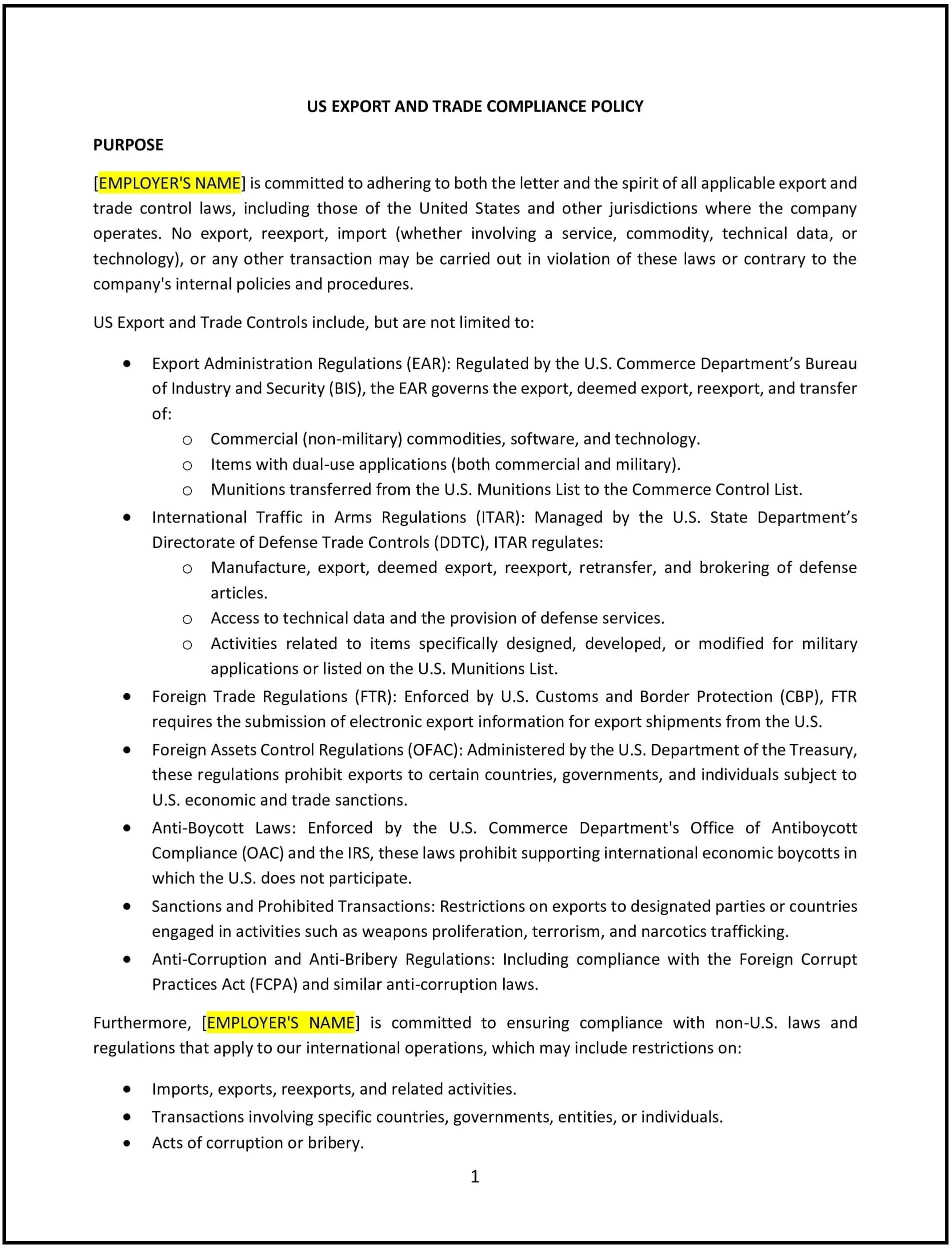US export and trade compliance policy (New Jersey): Free template
Got contracts to review? While you're here for policies, let Cobrief make contract review effortless—start your free review now.

Customize this template for free
US export and trade compliance policy (New Jersey)
A US export and trade compliance policy helps New Jersey businesses adhere to federal and state regulations governing the export of goods, services, and technology. This policy ensures that all export activities are conducted legally and responsibly, minimizing the risk of violating trade laws and regulations. It includes guidelines for licensing, reporting, documentation, and monitoring of exports and trade-related activities.
By adopting this policy, businesses in New Jersey can mitigate legal risks, maintain ethical standards, and ensure that their export operations align with both US and international trade laws.
How to use this US export and trade compliance policy (New Jersey)
- Define export regulations: Specify the US export laws and regulations that govern the business’s operations, including the Export Administration Regulations (EAR) and International Traffic in Arms Regulations (ITAR).
- Establish licensing requirements: Outline the procedures for determining when an export license is needed, including which items or services require licensing and the process for applying for a license.
- Set documentation standards: Specify the required documentation for exporting goods or services, such as export declarations, shipping records, and customer information.
- Provide training: Offer training for employees involved in the export process, ensuring they understand the legal requirements and how to comply with US export laws.
- Monitor export activities: Establish procedures for tracking and monitoring all exports to ensure that they meet legal requirements and are properly documented.
- Address prohibited exports: Define what constitutes prohibited exports under US law, including goods, services, or technology destined for embargoed countries or entities.
- Implement internal controls: Develop internal controls to prevent unauthorized exports and ensure that all trade activities comply with legal and regulatory requirements.
- Review and update: Regularly assess the policy to reflect changes in US export laws, New Jersey regulations, or company practices.
Benefits of using this US export and trade compliance policy (New Jersey)
This policy provides several benefits for New Jersey businesses:
- Reduces legal risks: Helps businesses avoid fines, penalties, and sanctions by ensuring compliance with export laws and regulations.
- Promotes ethical business practices: Reinforces the company’s commitment to ethical practices by ensuring that exports are handled responsibly and in compliance with the law.
- Strengthens global operations: Ensures that the company’s international trade activities are efficient, secure, and compliant, facilitating smooth operations in global markets.
- Enhances corporate reputation: Demonstrates the company’s dedication to maintaining high standards of legal and regulatory compliance, which can enhance its reputation with customers and partners.
- Supports business growth: Provides clarity and guidance for expanding into international markets while minimizing risks associated with export activities.
Tips for using this US export and trade compliance policy (New Jersey)
- Communicate the policy clearly: Ensure that all employees involved in export activities understand the policy and its requirements.
- Provide regular training: Offer training sessions to educate employees about export regulations and the importance of compliance.
- Monitor and track export activities: Set up tracking systems to ensure that exports are properly documented and that the company maintains records of all export transactions.
- Work with legal advisors: Consult with legal experts or trade compliance specialists to ensure that the company’s export activities are fully compliant with US and international laws.
- Review the policy regularly: Update the policy as necessary to reflect changes in export laws, business operations, or industry standards.